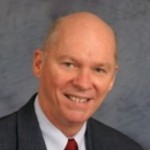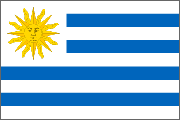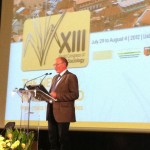Out-Going Council Meeting
International Rural Sociology Association
Lisbon, Portugal
July 29, 2012
The outgoing council meeting was called to order by President Almas at 14:47 without a quorum present. The decision was made that any necessary votes on motions would be taken via e-mail by Reider Almas. It was also noted that the incoming secretary-treasurer had agreed to take the minutes of the meeting in lieu of the outgoing secretary-treasurer. Those present included:
a. Sonia Bergamasco (ALASRU)
b. Geoff Lawrence (incoming president)
c. Lynda Chesire (AON and V.P.)
d. Charlambos Kasimis (ESRS)
e. Elizabeth Ransom (RSS)
f. Mustafa Koc (current program chair)
g. David Hansen (outgoing Secretary-Treasurer)
h. Stephanie Scott (guest from Canada)
i. Tom Dunk (guest from Canada)
j. Diego Pineiro (guest from ALASRU)
k. Muirhead Bruce (guest from Canada)
l. Ms. Hao (Toronto convention bureau)
m. Manuel Moreira (current Local Arrangements Chair)
n. Ray Jussaume (RSS and incoming secretary-treasurer)
o. Reidar Almas (outgoing president)
The minutes from the 2008 and 2010 meetings, which were previously approved by e-mail, were briefly discussed. Perhaps the major ongoing issue is the lack of representation from Africa. There is no active rural sociological association in Africa. IRSA has been trying for 10 years to get a regional association started in Africa.
The council next heard a report on the status of the Lisbon Congress from Manuel Moreira. Dr. Moreira noted that the Lisbon Congress originally registered 1,008 individuals, who together submitted nearly 1,500 abstracts. Some have subsequently dropped out. A final registration number will be forthcoming. All sponsorships received for the Congress have been in kind. There have been no major financial donations. Overall, it appears the Congress will cover its expenses and the 10,000 euros that will be owed to IRSA. Also, it was noted that the Lisbon Congress is allowing individuals to make presentations in their native languages so long as there is an English powerpoint. This has increased participation. For example, there almost 200 participants from Brazil and 90 from Mexico.
On behalf of the program committee, Dr. Moutafa Koc reported that the Lisbon Congress has seventy-one workshops. Mara Miele and Marie-Christine Renard have been very helpful co-chairs. Everything seems to be going well. This appears to be the best Congress turnout since Rio de Janeiro Congress
At this point, Dr. Koichi Ikegami from ARSA entered. A Quorum was now present and all votes could proceed as normal!
A Quadrennial Report was next delivered by Dr. David Hansen, the outgoing secretary-treasurer. Dr. Hanson noted that according to the IRSA by-laws, association dues payments should be made every four years. However, IRSA often bills early to help make it easier for member associations to pay. Thus, the question is whether we should change the by-laws. Dr. Hanson also noted that IRSA membership with ISA costs $150.00 per year!
Lynda Chesire suggested that the link to the current IRSA web site was not as obvious as it should be. She also stated that Michael Woods of the Journal for Rural Studies would like to communicate with IRSA. There will be a brown bag about journals on 8/2 during the Congress.
Geoff Lawrence then asked whether there were e-copies available of the book edited by Bonanno et al.? He also asked how many copies were sold? Hopefully these questions can be relayed to Dr. Bonanno.
MOTION: At this point Lynda Chesire moved that the quadrennial report presented by D. Hansen be accepted. Mustafa Koc seconded the motion. The motion was unanimously accepted by voice acclamation.
David Hansen then gave the financial report. He noted that it appears that the full payment would be received from the Lisbon organizers. This is good news as the World Congress is IRSA’s main source of income. David Hansen also noted that all regional associations are up to date in their dues payments to 2011 and the financial statement is also up to date. One thing that is a big help to the budget is that many of the leaders are paying for some or all of their own expenses when they attended Congresses.
MOTION: At this point Charlambos Kasimis moved that the financial report presented by D. Hansen be accepted. Manuel Moreira seconded the motion. The motion was unanimously accepted by voice acclamation.
The Council then heard the presentation for the Canadian bid for the 2016 World Congress by Mustafa Koc. Supporting Dr. Koc were several individuals in attendance from Canada. Dr. Koc said that several universities in the Toronto area were participating in the bid. The meetings will be based out of Ryerson University. The organizers would hope to raise funds and use any Congress surplus to support participation by scholars in the south. There is also an interest in trying to coordinate better with the RSS meetings. Dr. Koc asked for advice from the council as to how that might be done/
Elizabeth Ransom asked if anyone knew what the dates of RSS and ASA would be in 2016.
Lynda Chesire asked about conference rooms. Dr. Koc noted that all rooms will be booked until 8:00 just to keep them available. There are no plans to have sessions until 8:00. Sessions will be held until 6:30, but rooms will be open until 8:00.
Geoff Lawrence asked if more details about funds for awards for southern participation could be presented in the near future.
MOTION: Lynda Chesire then moved that Toronto, Canada be recognized as the location for the 2016 World Congress and that the Executive Committee finalize a Memorandum of Understanding for the hosting of the Congress. Charlambos Kasimis seconded the motion. The motion was unanimously accepted by voice acclamation.
A general discussion on several issues of concern then took place. The first item had to do with the publication of papers on the IRSA website and whether there will be a book coming from the Lisbon web site. It was noted that about 50 papers, out of a total of 1,500 abstracts, have been posted to the Congress, and not the IRSA, web site. David Hansen stated that IRSA should continue with the practice of posting papers – especially for the benefit of Scholars from the South. However, the web site needs to state clearly that these papers are not reviewed. This issue will be discussed more at the outgoing council meeting
It was then asked who the Program Chair for Toronto will be? Mustafa Koc expressed that diversity is important for the program committee. There is also a need for a good structure. It is important to balance such a committee with a hierarchical structure, i.e. to have a chair and assistant chair.
The issue of the role of Past Presidents also came up. Specifically, should there be a formal role for ex-Presidents on the executive committee? This would require a change to the by-laws. Elizabeth stated that changing by-lays sometimes lead to new structures that subsequently need to be changed in the future.
Mustafa Koc suggested that perhaps past president could have half a term ex officio role. Ransom and Kasimis wondered whether it was necessary to formalize such a process? Geoff Lawrence stated that perhaps we should focus on immediate past presidents. More discussion on this issue will take place at the incoming council meeting
With respect to future Issues, President Almas stated that he believes that IRSA needs an advisory committee to help with providing advice. This could also be a useful mechanism for broadening participation from the south, including Africa.
Reports from the Regional Associations were postponed until the incoming council meeting on Friday.
Reidar Almas extended his thanks to the council and especially to David Hansen, to whom he presented an “outstanding service award” on behalf of IRSA.
MOTION: Geoff Lawrence asked if someone would move for a formal vote of thanks to the outgoing council. The motion was made by Manuel Moreira and seconded by Mustafa Koc. The motion was unanimously accepted by voice acclamation.
Respectfully submitted by Raymond A. Jussaume Jr., Secretary-Treasurer



















 Time is approaching for the thirteenth world congress of rural sociology in Lisbon, Portugal, and it seems already to be a memorable congress. 75 working group leaders have been preparing a comprehensive program with 1450 papers. The scientific committee and the local organizing committee have undertaken a major effort to facilitate a program that also includes a number of excursions to the countryside in Portugal. This congress will be one with the largest turnout ever, with more than 1000 participants recorded so far. On behalf of IRSA, I will congratulate Professor Manuel Moreira and his team with an excellent preparation for this congress and we are looking forward to see each other in Lisbon July 29 to August 4.
Time is approaching for the thirteenth world congress of rural sociology in Lisbon, Portugal, and it seems already to be a memorable congress. 75 working group leaders have been preparing a comprehensive program with 1450 papers. The scientific committee and the local organizing committee have undertaken a major effort to facilitate a program that also includes a number of excursions to the countryside in Portugal. This congress will be one with the largest turnout ever, with more than 1000 participants recorded so far. On behalf of IRSA, I will congratulate Professor Manuel Moreira and his team with an excellent preparation for this congress and we are looking forward to see each other in Lisbon July 29 to August 4.